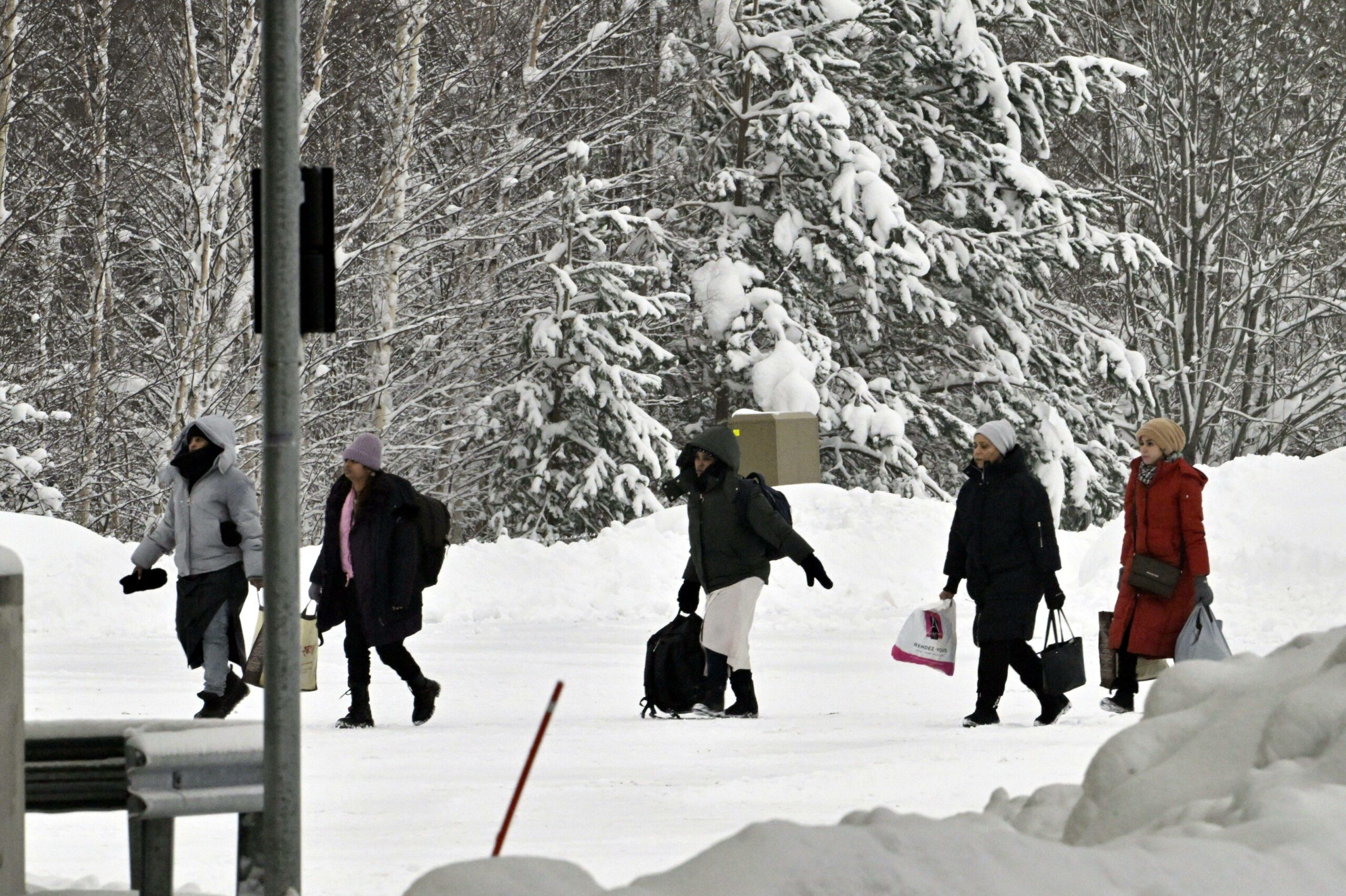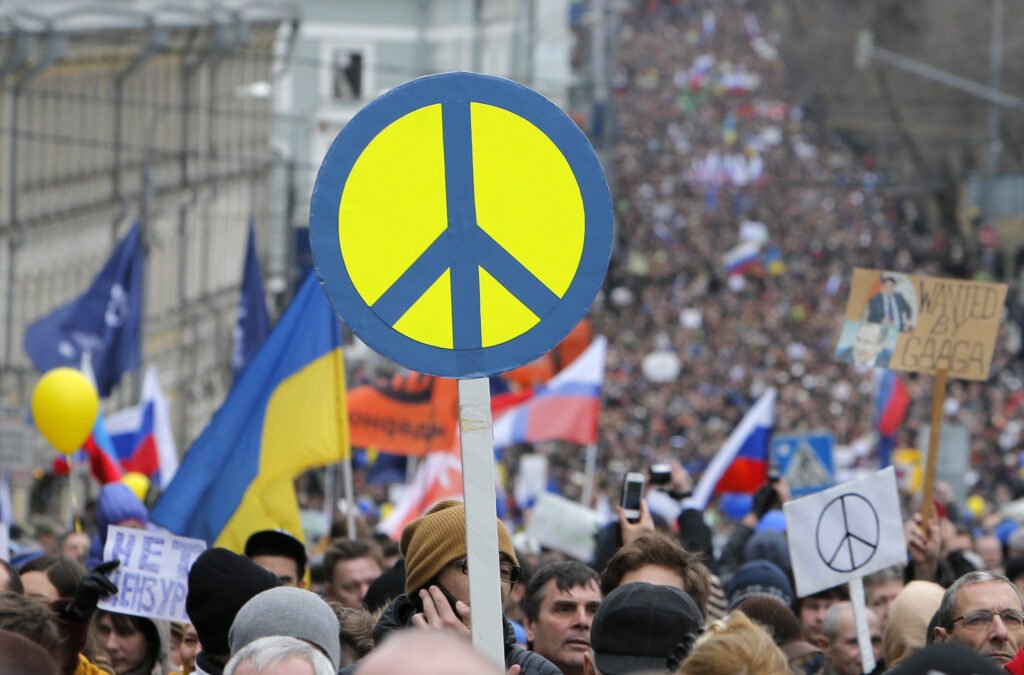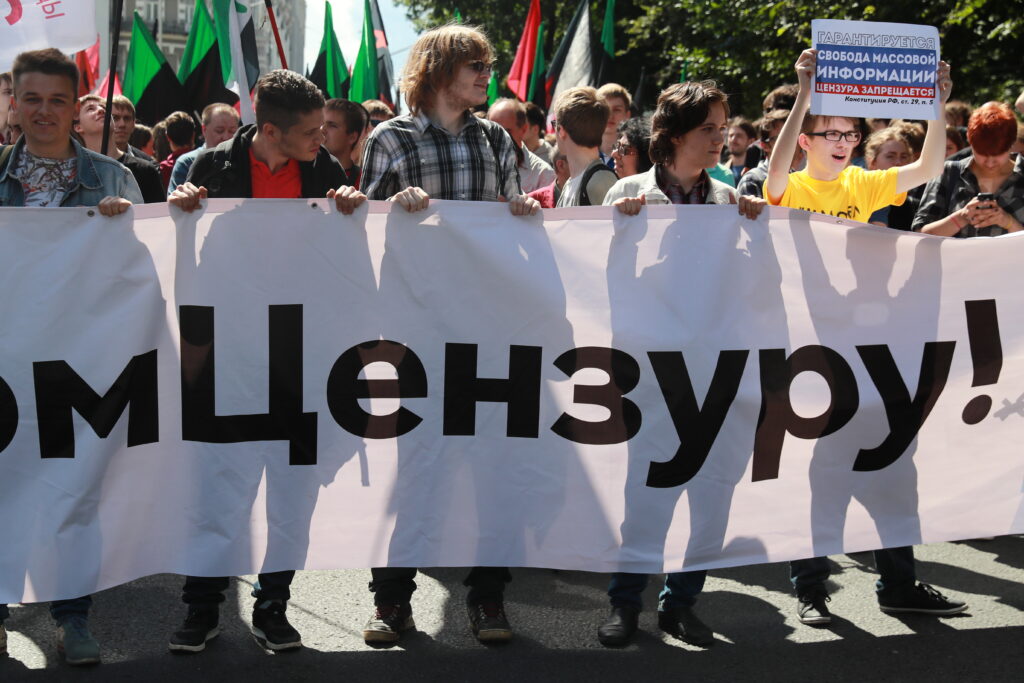«Emigration is akin to death. A transition to another world. (…) But it’s a peculiar kind of death. A death worse than death. (…) Today’s relocant is inspired by the grief of the Motherland. Belgorod under attack—and warmth spreads through their body. People in Shebekino in panic—almost an orgasm. The death of a Russian soldier—a sedative», wrote director Konstantin Bogomolov in the summer of 2023, describing Russian emigrants as undergoing a «transition to another world,» a kind of civic death. He portrayed «new relocants» as morally degraded individuals who gloat over the misfortunes of their compatriots.
This rhetoric is not merely the opinion of a provocative director but a reflection of the official narrative of Russian authorities and propaganda regarding the hundreds of thousands of citizens who left the country after February 2022. Comparing emigration to «civic death» and «betrayal» echoes the rhetoric of the authorities in Iran, Turkey, and Belarus, who similarly stigmatize their political emigrants.
But how does Russian society perceive this «new wave» of emigration? Why has the stigmatization of those who left become a tool to reinforce loyalty and intimidate those who stayed? And where lie the roots of the divide between those who left and those who remained?
Departure as «Moral Desertion»
Bogomolov’s words align with a long-standing tradition of authoritarian regimes viewing departure as treason and flight. According to Albert Hirschman’s theory, emigration is a form of «exit», an alternative to «voice» (active protest) or «loyalty» (commitment to the system). In democratic societies, emigration is seen as a personal choice, and criticism is a legitimate way to influence policy. However, in authoritarian systems, as political theorist Evgeny Roshchin convincingly shows, any loss of human capital becomes a political act. Refusing to «be loyal at all costs» is interpreted by the authorities as moral desertion, especially during times of crisis or war. Slogans like «we don’t abandon our own» reinforce the notion of citizenship as an unconditional duty: a true patriot must stay with the Motherland and regime under any circumstances.
The narrative of emigration as betrayal is shaped by equating departure with «fleeing» the country in a difficult moment. This rhetoric has roots in the Soviet era, when «non-returners» during the Cold War were branded «traitors to the Motherland.» Soviet legislation provided punishments not only for defectors but also for their families (arrest, exile, or forced labor). An example is the campaign against Oleg Bitov, an editor of Literaturnaya Gazeta, who defected to London in 1983. After his return, Soviet media used him to discredit the West.
In modern Russia, this approach is reproduced almost unchanged. The image of «fugitives» is actively promoted in official statements, on television, and online. Loyalty to the authorities is measured by physical presence in the country: stay, and you’re «one of us»; leave, and you’re automatically suspected of disloyalty.
Autocrats and Emigration
Authoritarian regimes deliberately use the stigmatization of emigrants to achieve their goals. In political sociology, such rhetoric is seen as a tool for social consolidation: by labeling those who left as «outsiders» and «traitors», the authorities contrast them with the «loyal» who stayed. This helps rally society within the country by demonizing an external enemy. Propaganda constructs a dichotomy: «we» are the patriotic people united around the leader, while «they» are cowardly deserters and traitors who abandoned us. This approach not only strengthens the loyalty of the regime’s core supporters but also intimidates those who waver.
Russia is not unique in this regard: similar narratives are common in Iran, Belarus, Turkey, Venezuela, and other authoritarian states. After the 1979 Islamic Revolution in Iran, much of the educated elite left the country. The Khomeini regime branded emigrants as «sellouts to the West» and disconnected from the «true Iran.» Decades later, Iranian conservatives continue to call the diaspora «inauthentic» Iranians. However, Iranian emigrants, especially in the US and Europe, have formed an active political community: they lobby for sanctions against the regime, spread information about human rights violations in Iran, and support their compatriots. Tehran’s rhetoric accusing them of betrayal only strengthens their protest identity, fostering solidarity with the regime’s victims.
A closer parallel to Russia is Belarus. After the suppression of protests in 2020, thousands of Belarusians—opposition activists, journalists, IT specialists—left the country, settling in Poland, Lithuania, and Ukraine. Alexander Lukashenko publicly called them «fugitive traitors,» stripped them of citizenship, and sentenced them to prison terms in absentia. In an interview with the BBC, he declared there would be no dialogue with «traitors who fled abroad.» Nevertheless, the Belarusian diaspora remains active. In Vilnius, Warsaw, and other cities, emigrants have created a resistance infrastructure, from independent media to initiatives for establishing tribunals. In response, Belarusian authorities have escalated transnational pressure, from threats against the families of fugitives to attempts by security services to organize assassinations abroad.
After the failed 2016 coup attempt, Recep Tayyip Erdoğan’s regime launched a massive campaign against supporters of opposition preacher Fethullah Gülen. Thousands of Turks, fearing arrests, left the country. The authorities branded them «fugitive Gülenists,» terrorists, and traitors. Legislation was introduced to prevent such emigrants from returning and to confiscate their property. Turkish society became divided: conservatives supported the expulsion of «traitors,» while the secular liberal public often sympathized with those who left.
Thus, stigmatizing emigrants is a common tactic of authoritarian regimes. It mobilizes society against an «enemy» and undermines alternative visions of the future represented by emigrants. This rhetoric also serves as an indicator of the regime’s nature: the louder the accusations against those who left, the more defensive and aggressive the authorities become, reflecting their fear of losing control over public consciousness.
Attitudes Toward Emigration Within Russia
In the summer of 2022, State Duma Speaker Vyacheslav Volodin called those who left Russia during the crisis «traitors,» later specifying that «the vast majority of society believes they betrayed their country, family, and friends.» This framing presented the stigma as «public opinion.» Legislative initiatives to «punish fugitives» soon followed. Since 2024, income earned by remote workers employed by Russian companies from abroad is taxed at 13−15%, even if the individual is not a tax resident of Russia. For «foreign agents», harsher measures are proposed: a 30% tax and restrictions on property and income transactions. Discussions also include proposals to strip such citizens of certain benefits and further tighten control. Federation Council speakers have supported this stance: Valentina Matviyenko noted that society views the departure of prominent figures as betrayal, especially if they «slander the Motherland» from abroad.
Concurrently, influential Kremlin-aligned figures have suggested barring returnees entirely. Director Nikita Mikhalkov proposed a state ban on the return of emigrant artists and their ability to work in Russian cultural institutions. This initiative was supported by MP Vitaly Milonov, who urged the Ministry of Culture to tighten employment conditions for artists who left Russia between 2022 and 2025. Volodin went further, calling for a blanket ban on hiring returnees from emigration in state or municipal roles or state-owned companies. «Even private organizations should be cautious about who they hire,» he added, claiming that most of his colleagues share this view.
Sociological surveys, both Russian and international, indicate a prevailing negative attitude toward emigrants in Russian society. According to a Levada Center poll conducted in April 2025, 37% of respondents consider those who left «traitors and betrayers of the Motherland,» and 36% see them as people «who don’t believe in Russia’s future.» Thus, over 70% associate emigration with disloyalty, attributing cowardice, disbelief, or selfishness to those who left. A smaller share views emigrants as victims of circumstances: 29% believe people leave primarily to avoid mobilization, 17% cite fear of political repression, and 10% point to discrimination in modern Russia as a driver of emigration. Only about 10% of Russians openly sympathize with those who left, a figure comparable to the historically low share of those wishing to emigrate (9% in 2023−2024). However, negative perceptions are gradually softening: the share of those who see emigrants as «educated, intelligent, talented» rose from 13% in March 2024 to 17% in April 2025.
Attitudes toward those who left also vary depending on the emigrants’ social status and reasons for departure. Celebrities who left Russia after the start of the full-scale war face the most hostility: 55% of respondents in March 2024 condemned well-known artists and TV presenters. Ordinary people fleeing mobilization face slightly less judgment—49%. Compared to 2023, positive assessments of departed celebrities have decreased, while negative ones have grown. Meanwhile, attitudes toward those who left due to mobilization are becoming more neutral, with a growing number expressing indifference.
According to a panel online survey conducted by the University of Helsinki in 2024−2025 under the author’s leadership, distrust toward emigrants who left Russia after 2022 rose from 26% in spring 2024 to 33% in summer 2025. Youth (18−29) and women show slightly more leniency: only 17% of young respondents express distrust toward emigrants, compared to over half of those over 50. Men are more distrustful (41%) than women (36%). Education level has little impact on attitudes toward emigration. Notably, a quarter to a third of respondents struggle to answer questions about emigration, suggesting either the topic’s sensitivity or indifference to it.
What fuels negative attitudes toward emigrants? Propaganda plays a significant role, but other factors are at play. The mass exodus of 2022 was a shock: for some, due to the loss of friends, neighbors, or colleagues; for others, due to their inability to leave despite wanting to. This breeds a sense of injustice: «Why could they leave while we’re forced to endure hardships?» Among the opposition-minded, resentment festers, fueled by feelings of abandonment. Similar sentiments were observed in Belarus, where alienation from the diaspora stemmed from the belief that those who left «abandoned» others to solve problems. Thus, the divide between «those who stayed» and «those who left» is fueled not only from above but also from below—by genuine grievances and regrets. The authorities skillfully channel these emotions into loyalty, implying that «you don’t choose your times or your homeland.»
Culture and Media: Purging the Information Space of «Non-Returners»
To cement the image of emigrants as «outsiders,» Russian authorities actively employ cultural mechanisms of exclusion. After the start of the full-scale war, Russia’s media space underwent a de facto «lustration» of departed cultural figures. Artists who left the country or openly criticized the authorities disappeared from television and radio. A prominent example is Alla Pugacheva, a pop legend who faced sharp criticism after leaving. Circus performer Edgard Zapashny declared that she «trampled herself as a person,» and the situation revealed «who’s who: who stands with the country and who’s against.» Other notable figures—rock musicians Zemfira, Boris Grebenshchikov, Andrey Makarevich, singer Monetochka, rapper Noize MC—were labeled «foreign agents,» effectively excluding their work from the official cultural sphere. By late 2023, radio stations had an unofficial «stop-list»: songs by emigrant artists were removed from rotation.
Equally significant is how emigrants are now portrayed in cultural content. In modern Russian series, films, and songs, emigrant characters are either absent or depicted caricaturally. Emigration is often treated in a humorous vein: jokes, memes, and sketches mock «relocants» who supposedly failed to adapt abroad and regret their decision. Popular Telegram channels spread humorous stories about «failed IT specialists» returning to Russia. Regime-loyal artists like Lada Dance reinforce this narrative, stating: «They left, so be it. God bless them. Let them live their lives. But I don’t understand how you can turn your back on your country and hate your people.»
«White Coat» and the National Divide: Mutual Grievances of the Departed and the Remaining
Beyond official propaganda, spontaneous memes born in society have played a significant role in the alienation between «those who left» and «those who stayed.» One such phenomenon is the «white coat» meme. In Russian internet slang, this metaphor denotes ostentatiously righteous, morally superior behavior. In the context of emigration, the phrase «take off the white coat» is often directed at critics abroad, accused of preaching to those in Russia from a position of moral superiority.
The «white coat» meme has become a tool to devalue the moral stance of emigrants. Their voices are preemptively dismissed as sanctimonious lecturing. As a result, any moral arguments—about responsibility for evil or complicity through silence—are rejected not on their merits but due to the speaker’s perceived arrogance or detachment from reality. Notably, the harshest statements against those who stayed often come from individuals unrelated to post-war emigration and representing privileged groups.
Recent studies show that many Russian emigrants retain trust in their compatriots. They are disillusioned with the state, not the people. Emigrants continue to support friends and family in Russia, donate to independent initiatives, and share information. Thus, bridges between «those who left» and «those who stayed» remain intact—communication persists. However, the state discourse deliberately suggests otherwise, erecting an emotional wall of alienation.
In this sense, the «white coat» narrative benefits the regime. It distracts from the essence of moral choices, replacing them with debates over «who’s more righteous.» Instead of dialogue about the country’s future or reflection on why hundreds of thousands left, unwilling to live under propaganda’s pressure, society descends into mutual accusations of arrogance and betrayal. One side says: «You left and lost the right to judge us.» The other responds: «You stayed and stayed silent—you’ll have to live with that.» This polarization serves the authorities: as long as the sides don’t hear each other due to grievances, the regime can tighten the screws and consolidate its position.










